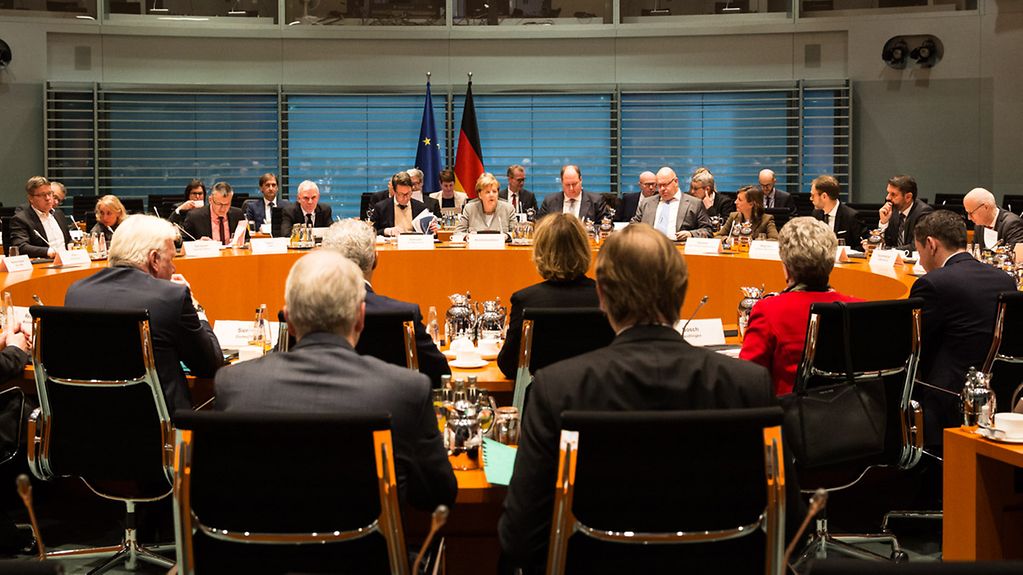Summit with local authorities to discuss Cleaner Air Programme
The German government is to raise the funding volume of the Cleaner Air Programme by 500 million euros, announced Chancellor Angela Merkel following a summit with local authority representatives in Berlin. The top-level meeting focused on the shared goal of avoiding driving bans as a way of addressing excessive nitrogen oxide pollution levels.
4 min reading time

Chancellor Angela Merkel met with representatives of local authorities and federal states to discuss air quality in urban areas
Photo: Bundesregierung/Steins
"I was able to announce today that funding for the Cleaner Air Programme is to be increased by half a billion euros," said Chancellor Angela Merkel following the top-level meeting at the Federal Chancellery. In addition, the federal government is to spend some 430 million euros to forge ahead with the hardware retrofitting of local authority vehicles. Until now one billion euros had been available for the Cleaner Air Programme.
Firing on all cylinders to avoid a driving ban
Angela Merkel also looked at the legal framework, and explained the recent amendments to the Federal Immission Control Act (Bundesimmissionsschutzgesetz) and license plate recognition systems. She reported that every effort is being made to put in place the prerequisites for hardware retrofitting. Federal Transport Minister Andreas Scheuer said that the German government is fighting driving bans with every instrument at its disposal. The German government is providing massive support for local authorities. "It is our aim to avoid driving bans and offer solutions."
Retaining mobility
The Chancellor invited representatives of local authorities and the federal states to this third top-level meeting. The Chancellor met with the representatives of 30 local authorities where air pollution levels are particularly high. The focus was on the challenge of improving air quality on the one hand, while retaining mobility on the other. The joint goal of federal and local governments is to comply with emission levels and avoid driving bans if at all possible.
Cleaner Air Programme
Another key to improving air quality is the Cleaner Air Programme which is set to run from 2017 to 2020. At the end of last year, the German government launched this programme worth a billion euros. The funds will be made available to local authorities lodging an application. Local authority measures that ensure that emissions are reduced as swiftly and sustainably as possible will receive funding.
With the Cleaner Air Programme, the federal government launched a package of measures to improve air quality in Germany’s towns and cities at the second summit meeting with local authorities on 28 November 2017. The additional 500 million euros announced on 3 December 2018, brings the total funding of the emergency programme to 1.5 billion euros. Funds are provided, for instance, for measures to electrify urban traffic and transport, and to digitalise traffic systems, as well as retrofitting diesel buses used in local public transport.
Swift and effective
Before the summit meeting, Helge Braun, Head of the Federal Chancellery, called on the local authorities to make use of the Cleaner Air Programme and to implement measures designed to avoid driving bans. "What is important now, is that all packages of measures launched should be implemented swiftly and effectively by all participants in their respective capacities."
The measures of the Cleaner Air Programme, especially the software updates already undertaken, have helped significantly improve air quality in many towns and cities. Across Germany, there is a clear trend towards lower nitrogen oxide levels. In 2016, a total of 90 towns and cities exceeded the permitted levels. In 2017, the number was down to 65.
Over 600 million euros authorised
Funding allocation has been speeded up and simplified thanks to the process of "förderunschädlichen Vorhabenbeginn" under which a project can be launched before financial assistance is approved without prejudicing the chance of obtaining funding, the use of existing assistance instruments and the swift publishing of new assistance guidelines. Funding totalling 600 million euros has already been approved, i.e. about 60% of the total funding volume. To date about 560 applications have been received from local authorities.
Guaranteeing individual mobility
At the start of October the German government adopted a "Concept for clean air while guaranteeing individual mobility". This gave local authorities more instruments for improving air quality, including assistance for hardware retrofitting of delivery vehicles, crafts and tradespersons’ vehicles and heavy local authority vehicles. The Cabinet decided on important changes to road traffic law and to the Federal Immission Control Act in November.
Amendments to the Federal Immission Control Act
The new provisions of the Federal Immission Control Act (Bundesimmissionsschutzgesetz) stipulate that in areas in which the nitrogen oxide pollution level does not exceed 50 micrograms per cubic metre no restrictions on traffic will generally be considered. In these cases the permissible limit can be achieved by other means. This was another point discussed by summit participants.